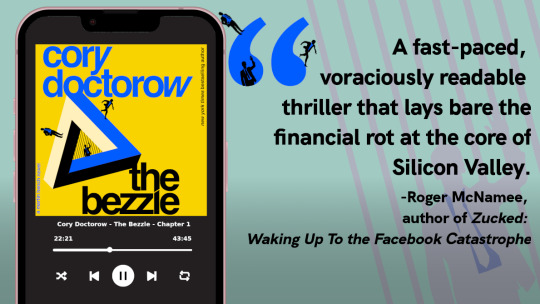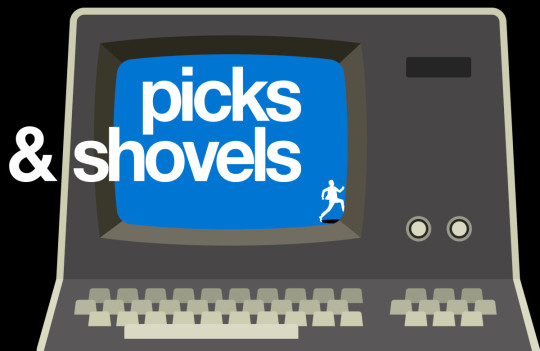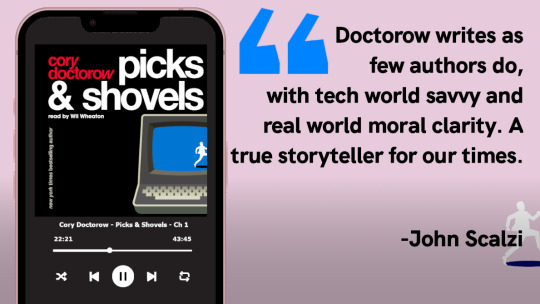#MLMs
Explore tagged Tumblr posts
Text
Sympathy for the spammer

Catch me in Miami! I'll be at Books and Books in Coral Gables on Jan 22 at 8PM.

In any scam, any con, any hustle, the big winners are the people who supply the scammers – not the scammers themselves. The kids selling dope on the corner are making less than minimum wage, while the respectable crime-bosses who own the labs clean up. Desperate "retail investors" who buy shitcoins from Superbowl ads get skinned, while the MBA bros who issue the coins make millions (in real dollars, not crypto).
It's ever been thus. The California gold rush was a con, and nearly everyone who went west went broke. Famously, the only reliable way to cash out on the gold rush was to sell "picks and shovels" to the credulous, doomed and desperate. That's how Leland Stanford made his fortune, which he funneled into eugenics programs (and founding a university):
https://www.hachettebookgroup.com/titles/malcolm-harris/palo-alto/9780316592031/
That means that the people who try to con you are almost always getting conned themselves. Think of Multi-Level Marketing (MLM) scams. My forthcoming novel The Bezzle opens with a baroque and improbable fast-food Ponzi in the town of Avalon on the island of Catalina, founded by the chicle monopolist William Wrigley Jr:
http://thebezzle.org
Wrigley found fast food declasse and banned it from the island, a rule that persists to this day. In The Bezzle, the forensic detective Martin Hench uncovers The Fry Guys, an MLM that flash-freezes contraband burgers and fries smuggled on-island from the mainland and sells them to islanders though an "affiliate marketing" scheme that is really about recruiting other affiliate markets to sell under you. As with every MLM, the value of the burgers and fries sold is dwarfed by the gigantic edifice of finance fraud built around it, with "points" being bought and sold for real cash, which is snaffled up and sucked out of the island by a greedy mainlander who is behind the scheme.
A "bezzle" is John Kenneth Galbraith's term for "the magic interval when a confidence trickster knows he has the money he has appropriated but the victim does not yet understand that he has lost it." In every scam, there's a period where everyone feels richer – but only the scammers are actually cleaning up. The wealth of the marks is illusory, but the longer the scammer can preserve the illusion, the more real money the marks will pump into the system.
MLMs are particularly ugly, because they target people who are shut out of economic opportunity – women, people of color, working people. These people necessarily rely on social ties for survival, looking after each others' kids, loaning each other money they can't afford, sharing what little they have when others have nothing.
It's this social cohesion that MLMs weaponize. Crypto "entrepreneurs" are encouraged to suck in their friends and family by telling them that they're "building Black wealth." Working women are exhorted to suck in their bffs by appealing to their sisterhood and the chance for "women to lift each other up."
The "sales people" trying to get you to buy crypto or leggings or supplements are engaged in predatory conduct that will make you financially and socially worse off, wrecking their communities' finances and shattering the mutual aid survival networks they rely on. But they're not getting rich on this – they're also being scammed:
https://papers.ssrn.com/sol3/papers.cfm?abstract_id=4686468
This really hit home for me in the mid-2000s, when I was still editing Boing Boing. We had a submission form where our readers could submit links for us to look at for inclusion on the blog, and it was overwhelmed by spam. We'd add all kinds of antispam to it, and still, we'd get floods of hundreds or even thousands of spam submissions to it.
One night, I was lying in my bed in London and watching these spams roll in. They were all for small businesses in the rustbelt, handyman services, lawn-care, odd jobs, that kind of thing. They were 10 million miles from the kind of thing we'd ever post about on Boing Boing. They were coming in so thickly that I literally couldn't finish downloading my email – the POP session was dropping before I could get all the mail in the spool. I had to ssh into my mail server and delete them by hand. It was maddening.
Frustrated and furious, I started calling the phone numbers associated with these small businesses, demanding an explanation. I assumed that they'd hired some kind of sleazy marketing service and I wanted to know who it was so I could give them a piece of my mind.
But what I discovered when I got through was much weirder. These people had all been laid off from factories that were shuttering due to globalization. As part of their termination packages, their bosses had offered them "retraining" via "courses" in founding their own businesses.
The "courses" were the precursors to the current era's rise-and-grind hustle-culture scams (again, the only people getting rich from that stuff are the people selling the courses – the "students" finish the course poorer). They promised these laid-off workers, who'd given their lives to their former employers before being discarded, that they just needed to pull themselves up by their own boostraps:
https://pluralistic.net/2023/04/10/declaration-of-interdependence/#solidarity-forever
After all, we had the internet now! There were so many new opportunities to be your own boss! The course came with a dreadful build-your-own-website service, complete with an overpriced domain sales portal, and a single form for submitting your new business to "thousands of search engines."
This was nearly 20 years ago, but even then, there was really only one search engine that mattered: Google. The "thousands of search engines" the scammers promised to submit these desperate peoples' websites to were just submission forms for directories, indexes, blogs, and mailing lists. The number of directories, indexes, blogs and mailing lists that would publish their submissions was either "zero" or "nearly zero." There was certainly no possibility that anyone at Boing Boing would ever press the wrong key and accidentally write a 500-word blog post about a leaf-raking service in a collapsing deindustrialized exurb in Kentucky or Ohio.
The people who were drowning me in spam weren't the scammers – they were the scammees.
But that's only half the story. Years later, I discovered how our submission form was getting included in this get-rich-quick's mass-submission system. It was a MLM! Coders in the former Soviet Union were getting work via darknet websites that promised them relative pittances for every submission form they reverse-engineered and submitted. The smart coders didn't crack the forms directly – they recruited other, less business-savvy coders to do that for them, and then often as not, ripped them off.
The scam economy runs on this kind of indirection, where scammees are turned into scammers, who flood useful and productive and nice spaces with useless dross that doesn't even make them any money. Take the submission queue at Clarkesworld, the great online science fiction magazine, which famously had to close after it was flooded with thousands of junk submission "written" by LLMs:
https://www.npr.org/2023/02/24/1159286436/ai-chatbot-chatgpt-magazine-clarkesworld-artificial-intelligence
There was a zero percent chance that Neil Clarke would accidentally accept one of these submissions. They were uniformly terrible. The people submitting these "stories" weren't frustrated sf writers who'd discovered a "life hack" that let them turn out more brilliant prose at scale.
They were scammers who'd been scammed into thinking that AIs were the key to a life of passive income, a 4-Hour Work-Week powered by an AI-based self-licking ice-cream cone:
https://pod.link/1651876897/episode/995c8a778ede17d2d7cff393e5203157
This is absolutely classic passive-income brainworms thinking. "I have a bot that can turn out plausible sentences. I will locate places where sentences can be exchanged for money, aim my bot at it, sit back, and count my winnings." It's MBA logic on meth: find a thing people pay for, then, without bothering to understand why they pay for that thing, find a way to generate something like it at scale and bombard them with it.
Con artists start by conning themselves, with the idea that "you can't con an honest man." But the factor that predicts whether someone is connable isn't their honesty – it's their desperation. The kid selling drugs on the corner, the mom desperately DMing her high-school friends to sell them leggings, the cousin who insists that you get in on their shitcoin – they're all doing it because the system is rigged against them, and getting worse every day.
These people reason – correctly – that all the people getting really rich are scamming. If Amazon can make $38b/year selling "ads" that push worse products that cost more to the top of their search results, why should the mere fact that an "opportunity" is obviously predatory and fraudulent disqualify it?
https://pluralistic.net/2023/11/29/aethelred-the-unready/#not-one-penny-for-tribute
The quest for passive income is really the quest for a "greater fool," the economist's term for the person who relieves you of the useless crap you just overpaid for. It rots the mind, atomizes communities, shatters solidarity and breeds cynicism:
https://pluralistic.net/2023/02/24/passive-income/#swiss-cheese-security
The rise and rise of botshit cannot be separated from this phenomenon. The botshit in our search-results, our social media feeds, and our in-boxes isn't making money for the enshittifiers who send it – rather, they are being hustled by someone who's selling them the "picks and shovels" for the AI gold rush:
https://www.theguardian.com/commentisfree/2024/jan/03/botshit-generative-ai-imminent-threat-democracy
That's the true cost of all the automation-driven unemployment criti-hype: while we're nowhere near a place where bots can steal your job, we're certainly at the point where your boss can be suckered into firing you and replacing you with a bot that fails at doing your job:
https://pluralistic.net/2024/01/11/robots-stole-my-jerb/#computer-says-no
The manic "entrepreneurs" who've been stampeded into panic by the (correct) perception that the economy is a game of musical chairs where the number of chairs is decreasing at breakneck speed are easy marks for the Leland Stanfords of AI, who are creating generational wealth for themselves by promising that their bots will automate away all the tedious work that goes into creating value. Expect a lot more Amazon Marketplace products called "I'm sorry, I cannot fulfil this request as it goes against OpenAI use policy":
https://www.theverge.com/2024/1/12/24036156/openai-policy-amazon-ai-listings
No one's going to buy these products, but the AI picks-and-shovels people will still reap a fortune from the attempt. And because history repeats itself, these newly minted billionaires are continuing Leland Stanford's love affair with eugenics:
https://www.truthdig.com/dig-series/eugenics/
The fact that AI spam doesn't pay is important to the fortunes of AI companies. Most high-value AI applications are very risk-intolerant (self-driving cars, radiology analysis, etc). An AI tool might help a human perform these tasks more accurately – by warning them of things that they've missed – but that's not how AI will turn a profit. There's no market for AI that makes your workers cost more but makes them better at their jobs:
https://locusmag.com/2023/12/commentary-cory-doctorow-what-kind-of-bubble-is-ai/
Plenty of people think that spam might be the elusive high-value, low-risk AI application. But that's just not true. The point of AI spam is to get clicks from people who are looking for better content. It's SEO. No one reads 2000 words of algorithm-pleasing LLM garbage over an omelette recipe and then subscribes to that site's feed.
And the omelette recipe generates pennies for the spammer that posted it. They are doing massive volume in order to make those pennies into dollars. You don't make money by posting one spam. If every spammer had to pay the actual recovery costs (energy, chillers, capital amortization, wages) for their query, every AI spam would lose (lots of) money.
Hustle culture and passive income are about turning other peoples' dollars into your dimes. It is a negative-sum activity, a net drain on society. Behind every seemingly successful "passive income" is a con artist who's getting rich by promising – but not delivering – that elusive passive income, and then blaming the victims for not hustling hard enough:
https://www.ftc.gov/business-guidance/blog/2023/12/blueprint-trouble

I'm Kickstarting the audiobook for The Bezzle, the sequel to Red Team Blues, narrated by @wilwheaton! You can pre-order the audiobook and ebook, DRM free, as well as the hardcover, signed or unsigned. There's also bundles with Red Team Blues in ebook, audio or paperback.

If you'd like an essay-formatted version of this post to read or share, here's a link to it on pluralistic.net, my surveillance-free, ad-free, tracker-free blog:
https://pluralistic.net/2024/01/15/passive-income-brainworms/#four-hour-work-week

Image: Cryteria (modified) https://commons.wikimedia.org/wiki/File:HAL9000.svg
CC BY 3.0 https://creativecommons.org/licenses/by/3.0/deed.en
#pluralistic#late-stage capitalism#end-stage capitalism#feudalism#rentierism#blueprint for wealth#predation#clarkesworld#kindle#kindle unlimited program#kup#pyramid schemes#mlms#multilevel marketing#amway#spam#form spam#enshittification#ai#llms#large language models#chatbots#ucm#seo#search engine optimization#dark seo#passive income#passive income brainworms
825 notes
·
View notes
Text
Investing in Cryptocurrency is Bad and Stupid
If you’ve been reading our blog for long, you probably could’ve guessed we think investing in cryptocurrency is bad and stupid.
And yeah, I considered using more expansive words like “unethical” and “speculative” instead of “bad and stupid.” Those words had precision, but lacked panache.
Our Patreon donors vote on potential article topics, and this month they wanted to read our thoughts on investing in cryptocurrency. So we get questions about it all the time! Which isn’t surprising. Relative to cash and traditional investment vehicles, crypto is new and confusing. To make matters worse, there’s so much hype surrounding it in the personal finance world that research feels like reading a data science textbook through a swarm of bees.
Mercifully, we’re not here to explain what crypto is, or how the mysterious blockchain technology works (others have done that intolerably boring work for us). Rather, we’re going to release you from caring about crypto in the first place!
So it’s our personal opinion that investing in cryptocurrency is bad and stupid, and you shouldn’t do it. Here’s why.
Keep reading.
Did we just help you out? Say thanks on Patreon!
42 notes
·
View notes
Text
have y'all seen all the drama with the MLMs scrambling to restructure in some way so they won't be considered MLMs anymore 👀👀👀👀 and cutting pay and jobs in the process
all i know is that the MLM girlies are kinda losing it right now and that there's a few companies doing it
20 notes
·
View notes
Text
Reminded how much I hate MLMs when I see all the women MLM "business owners" with "mom" or "mama" in their bios just trying to make money for their families and being sucked into the financial shithole that is an MLM preying on desperate people, especially women.
#mlms#you do not own the business you are a sales rep who has to buy your own merch to sell#these companies are preying on you
6 notes
·
View notes
Text
was accidentally on the for you tab instead of the following tab and god

I mean I know mlms are just fujos but why are they so so unbearable 😭 like be a fujo in private, girlie.
2 notes
·
View notes
Text
youtube
I can't believe I haven't posted this before, because this video is everything. Such a good examination of MLMs! It goes into what makes them cults, the magical thinking, the survivorship bias, all the manipulation, etc.
#it immediately sucks you in lol#there's a two-part video on the secret too and i loved it#mlm#mlms#antimlm#anti mlm#cults#cult#thought control#scentsy#amway#avon#mary kay#herbalife#younique#arbonne#isagenix#primerica#doterra#tupperware#capitalism#manipulation#brainwashing#magical thinking#survivorship bias#youtube#james jani#Youtube
6 notes
·
View notes
Text
MLM the sexual orientation vs MLM the pyramid scheme
The most annoying girl you know from high school is OBSESSED with them
Way more bottom people than top people and the bottom ones get FUCKED
Use 'hun' and 'girl' in a way that feels nice but you know isn't
5 notes
·
View notes
Text
Another girl I vaguely remember from school got sucked into an MLM. She is now posting several videos (10+?) a day on Facebook and TikTok where she is sitting at home or in her car or walking through fields, rambling with at best mid enthusiasm, very clearly only repeating what she has been told to say. She hits all the MLM buzz words all over again. "Supplement your income". "Stop living in fear". "Quit your 9 to 5." "Financial independence." "Take action". Etc.
It's like I'm watching her have a mental breakdown in real time. I can literally see the light draining from her eyes.
#mlm#mlms#:(#multi level marketing#the best way to help is to ignore her and let it run its course right?
3 notes
·
View notes
Text
youtube
2 notes
·
View notes
Text
I fucking love MLMs, they're so interesting in how they just invade the mind of the people who fall for them.

28K notes
·
View notes
Text
Chapter One of “Picks and Shovels” (Part 1)

Picks and Shovels is a new, standalone technothriller starring Marty Hench, my two-fisted, hard-fighting, tech-scam-busting forensic accountant. You can pre-order it on my latest Kickstarter, which features a brilliant audiobook read by Wil Wheaton.

My next novel is Picks and Shovels, out next month. It's tells the origin story of Martin Hench, my hard-charging, scambusting, high-tech forensic accountant, in a 1980s battle over the soul of a PC company:
https://us.macmillan.com/books/9781250865908/picksandshovels
I'm currently running a Kickstarter to pre-sell the book in every format: hardcover, DRM-free ebook, and an independently produced, fabulous DRM-free audiobook read by Wil Wheaton, who just nailed the delivery:
https://www.kickstarter.com/projects/doctorow/picks-and-shovels-marty-hench-at-the-dawn-of-enshittification
Picks and Shovels opens with a long prologue that recounts Marty's misadventures as a failing computer science student at MIT, his love-affair with computers, and his first disastrous startup venture. It ends with him decamping to Silicon Valley with his roommate Art, a brilliant programmer, to seek their fortune.
Chapter one opens with Marty's first job, working for a weird PC company (there were so many weird PC companies back then!). I've posted Wil's audio reading of chapter one as a teaser for the Kickstarter:
https://www.youtube.com/watch?v=IGXz1mkAd2Q
(Here it is as an MP3 at the Internet Archive:)
https://ia600607.us.archive.org/5/items/picks-and-shovels-promo/audio.mp3
The audio is great, but I thought I'd also serialize the text of Chapter One here, in five or six chunks. If you enjoy this and want to pre-order the book, please consider backing the Kickstarter:
https://www.kickstarter.com/projects/doctorow/picks-and-shovels-marty-hench-at-the-dawn-of-enshittification
Chapter One
Fidelity Computing was the most colorful PC company in Silicon Valley.
A Catholic priest, a Mormon bishop, and an Orthodox rabbi walk into a technology gold rush and start a computer company. The fact that it sounded like the setup for a nerdy joke about the mid-1980s was fantastic for their bottom line. Everyone who heard their story loved it.
As juicy as the story of Fidelity Computing was, they flew under most people’s radar for years, even as they built a wildly profitable technology empire through direct sales through faith groups. The first time most of us heard of them was in 1983, when Byte ran its cover story on Fidelity Computing, unearthing a parallel universe of technology that had grown up while no one was looking.
At first, I thought maybe they were doing something similar to Apple’s new Macintosh: like Apple, they made PCs (the Wise PC), an operating system (Wise DOS), and a whole line of monitors, disk drives, printers, and software.
Like the Mac, none of these things worked with anything else—you needed to buy everything from floppy disks to printer cables specially from them, because nothing anyone else made would work with their system.
And like the Mac, they sold mostly through word of mouth. The big difference was that Mac users were proud to call themselves a cult, while Fidelity Computing’s customers were literally a religion.
Long after Fidelity had been called to the Great Beyond, its most loyal customers gave it an afterlife, nursing their computers along, until the parts and supplies ran out. They’d have kept going even then, if there’d been any way to unlock their machines and use the same stuff the rest of the computing world relied on. But that wasn’t something Fidelity Computing would permit, even from beyond the grave.
I was summoned to Fidelity headquarters—in unfashionable Colma, far from the white-hot start-ups of Palo Alto, Mountain View, and, of course, Cupertino—by a friend of Art’s. Art had a lot more friends than me. I was a skipping stone, working as the part-time bookkeeper/accountant/CFO for half a dozen companies and never spending more than one or two days in the same office.
Art was hardly more stable than me—he switched start-ups all the time, working for as little as two months (and never for more than a year) before moving on. His bosses knew what they were getting: you hired Art Hellman to blaze into your company, take stock of your product plan, root out and correct all of its weak points, build core code libraries, and then move on. He was good enough and sufficiently in demand to command the right to behave this way, and he wouldn’t have it any other way. My view was, it was an extended celebration of his liberation from the legal villainy of Nick Cassidy III: having narrowly escaped a cage, he was determined never to be locked up again.
Art’s “engagements”—as he called them—earned him the respect and camaraderie of half the programmers and hardware engineers in the Valley. This, in spite of the fact that he was a public and ardent member of the Lavender Panthers, wore the badge on his lapel, went to the marches, and brought his boyfriend to all the places where his straight colleagues brought their girlfriends.
He’d come out to me less than a week after I arrived by the simple expedient of introducing the guy he was watching TV with in our living room as Lewis, his boyfriend. Lewis was a Chinese guy about our age, and his wardrobe—plain white tee, tight blue jeans, loafers—matched the new look Art had adopted since leaving Boston. Lewis had a neat, short haircut that matched Art’s new haircut, too.
To call the Art I’d known in Cambridge a slob would be an insult to the natty, fashion-conscious modern slob. He’d favored old band T-shirts with fraying armpit seams, too-big jeans that were either always sliding off his skinny hips or pulled up halfway to his nipples. In the summer, his sneakers had holes in the toes. In the winter, his boots were road-salt-crusted crystalline eruptions. His red curls were too chaotic for a white-boy ’fro and were more of a heap, and he often went days without shaving.
There were members of the Newbury Street Irregulars who were bigger slobs than Art, but they smelled. Art washed, but otherwise, he looked like a homeless person (or a hacker). His transformation to a neatly dressed, clean-shaven fellow with a twenty-five-dollar haircut that he actually used some sort of hairspray on was remarkable. I’d assumed it was about his new life as a grown-up living far from home and doing a real job. It turned out that wasn’t the reason at all.
“Oh,” I said. “That makes a lot of sense.” I shook Lewis’s hand. He laughed. I checked Art. He was playing it cool, but I could tell he was nervous. I remembered Lucille and how she listened, and what it felt like to be heard. I thought about Art, and the things he’d never been able to tell me.
There’d been a woman in the Irregulars who there were rumors about, and there were a pair of guys one floor down in Art’s building who held hands in the elevator, but as far as I knew up until that moment, I hadn’t really ever been introduced to a homosexual person. I didn’t know how I felt about it, but I did know how I wanted to feel about it.
So Art didn’t just get to know all kinds of geeks from his whistle-stop tour of Silicon Valley’s hottest new tech ventures. He was also plugged into this other network of people from the Lavender Panthers, and their boyfriends and girlfriends, and the people he knew from bars and clubs. He and Lewis lasted for a couple of months, and then there were a string of weekends where there was a new guy at the breakfast table, and then he settled down again for a while with Artemis, and then he hit a long dry spell.
I commiserated. I’d been having a dry spell for nearly the whole two years I’d been in California. The closest I came to romance was exchanging a letter with Lucille every couple of weeks—she was a fine pen pal, but that wasn’t really a substitute for a living, breathing woman in my life.
Art threw himself into his volunteer work, and he was only half joking when he said he did it to meet a better class of boys than you got at a club. Sometimes, there’d be a committee meeting in our living room and I’d hear about the congressional committee hearing on the “gay plague” and the new wave of especially vicious attacks. It was pretty much the only time I heard about that stuff—no one I worked with ever brought it up, unless it was to make a terrible joke.
It was Murf, one of the guys from those meetings, who told me that Fidelity Computing was looking for an accountant for a special project. He had stayed after the meeting and he and Art made a pot of coffee and sat down in front of Art’s Apple clone, a Franklin Ace 1200 that he’d scored six months ahead of its official release. After opening the lid to show Murf the interior, Art fired it up and put it through its paces.
I hovered over his shoulder, watching. I’d had a couple of chances to play with the 1200, and I wanted one more than anything in the world except for a girlfriend.
“Marty,” Art said, “Murf was telling me about a job I thought you might be good for.”
The Ace 1200 would have a list price of $2,200. I pulled up a chair.
Fidelity Computing’s business offices were attached to their warehouse, right next to their factory. It took up half of a business park in Colma, and I had to circle it twice to find a parking spot. I was five minutes late and flustered when I presented myself to the receptionist, a blond woman with a ten – years – out – of – date haircut and a modest cardigan over a sensible white shirt buttoned to the collar, ring on her finger.
“Hello,” I said. “I’m Marty Hench. I—uh—I’ve got a meeting with the Reverend Sirs.” That was what the executive assistant I’d spoken to on the phone had called them. It sounded weird when he said it. It sounded weirder when I said it.
The receptionist gave me a smile that only went as far as her lips. “Please have a seat,” she said. There were only three chairs in the little reception area, vinyl office chairs with worn wooden armrests. There weren’t any magazines, just glossy catalogs featuring the latest Fidelity Computing systems, accessories, consumables, and software. I browsed one, marveling at the parallel universe of computers in the strange, mauve color that denoted all Fidelity equipment, including the boxes, packaging, and, now that I was attuned to it, the accents and carpet in the small lobby. A side door opened and a young, efficient man in a kippah and wire-rim glasses called for me: “Mr. Hench?” I closed the catalog and returned it to the pile and stood. As I went to shake his hand, I realized that something had been nagging me about the catalog—there were no prices.
“I’m Shlomo,” the man said. “We spoke on the phone. Thank you for coming down. The Reverend Sirs are ready to see you now.”
He wore plain black slacks, hard black shiny shoes, and a white shirt with prayer-shawl tassels poking out of its tails. I followed him through a vast room filled with chest-high Steelcase cubicles finished in yellowing, chipped wood veneer, every scratch pitilessly lit by harsh overhead fluorescents. Most of the workers at the cubicles were women with headsets, speaking in hushed tones. The tops of their heads marked the interfaith delineators: a block of Orthodox headscarves, then a block of nuns’ black and white scarves (I learned to call them “veils” later), then the Mormons’ carefully coiffed, mostly blond dos.
“This way,” Shlomo said, passing through another door and into executive row. The mauve carpets were newer, the nap all swept in one direction. The walls were lined with framed certificates of appreciation, letters from religious and public officials (apparently, the church and state were not separate within the walls of Fidelity Computing), photos of groups of progressively larger groups of people ranked before progressively larger offices—the company history.
We walked all the way to the end of the hall, past closed doors with nameplates, to a corner conference room with a glass wall down one side, showing a partial view of a truck-loading dock behind half-closed vertical blinds. Seated at intervals around a large conference table were the Reverend Sirs themselves, each with his own yellow pad, pencil, and coffee cup.
Shlomo announced me: “Reverend Sirs, this is Marty Hench. Mr. Hench, these are Rabbi Yisrael Finkel, Bishop Leonard Clarke, and Father Marek Tarnowski.” He backed out of the door, leaving me standing, unsure if I should circle the table shaking hands, or take a seat, or—
“Please, sit,” Rabbi Finkel said. He was fiftyish, round-faced and bear-shaped with graying sidelocks and beard and a black suit and tie. His eyes were sharp behind horn-rimmed glasses. He gestured to a chair at the foot of the table.
I sat, then rose a little to undo the button of my sport coat. I hadn’t worn it since my second job interview, when I realized it was making the interviewers uncomfortable. It certainly made me uncomfortable. I fished out the little steno pad and stick pen I’d brought with me.
“Thank you for coming, Mr. Hench.” The rabbi had an orator’s voice, that big chest of his serving as a resonating chamber like a double bass.
“Of course,” I said. “Thanks for inviting me. It’s a fascinating company you have here.”
Bishop Clarke smiled at that. He was the best dressed of the three, in a well-cut business suit, his hair short, neat, side-parted. His smile was very white, and very wide. He was the youngest of the three—in his late thirties, I’d guess. “Thank you,” he said. “We know we’re very different from the other computer companies, and we like it that way. We like to think that we see something in computers—a potential—that other people have missed.”
Father Tarnowski scowled. He was cadaverously tall and thin, with the usual dog collar and jacket, and a heavy gold class ring. His half-rim glasses flashed. He was the oldest, maybe sixty, and had a sour look that I took for habitual. “He doesn’t want the press packet, Leonard,” he said. “Let’s get to the point.” He had a broad Chicago accent like a tough-guy gangster in The Untouchables.
Bishop Clarke’s smile blinked off and on for an instant and I was overcome with the sudden knowledge that these two men did not like each other at all, and that there was some kind of long-running argument simmering beneath the surface. “Thank you, Marek, of course. Mr. Hench’s time is valuable.” Father Tarnowski snorted softly at that and the bishop pretended he didn’t hear it, but I saw Rabbi Finkel grimace at his yellow pad.
“What can I help you Reverend Sirs with today?” Reverend Sirs came more easily now, didn’t feel ridiculous at all. The three of them gave the impression of being a quarter inch away from going for each other’s throats, and the formality was a way to keep tensions at a distance.
“We need a certain kind of accountant,” the rabbi said. He’d dated the top of his yellow pad and then circled the date. “A kind of accountant who understands the computer business. Who understands computers, on a technical level. It’s hard to find an accountant like that, believe it or not, even in Silicon Valley.” I didn’t point out that Colma wasn’t in Silicon Valley.
“Well,” I said, carefully. “I think I fit that bill. I’ve only got an associate’s degree in accounting, but I’m a kind of floating CFO for half a dozen companies and I’ve been doing night classes at UCSF Extension to get my bachelor’s. I did a year at MIT and built my own computer a few years back. I program pretty well in BASIC and Pascal and I’ve got a little C, and I’m a pretty darned good debugger, if I do say so myself.”
Bishop Clarke gave a small but audible sigh of relief. “You do indeed sound perfect, and I’m told that Shlomo spoke to your references and they were very enthusiastic about your diligence and . . . discretion.”
I’d given Shlomo a list of four clients I’d done extensive work with, but I hadn’t had “discretion” in mind when I selected them. It’s true that doing a company’s accounts made me privy to some sensitive information—like when two employees with the same job were getting paid very different salaries—but I got the feeling that wasn’t the kind of “discretion” the bishop had in mind.
“I’m pretty good at minding my own business,” I said, and then, “even when I’m being paid to mind someone else’s.” I liked that line, and made a mental note about it. Maybe someday I’d put it on my letterhead. Martin Hench: Confidential CPA.
The bishop favored me with a chuckle. The rabbi nodded thoughtfully. The priest scowled.
“That’s very good,” the bishop said. “What we’d like to discuss today is of a very sensitive nature, and I’m sure you’ll understand if we would like more than your good word to rely on.” He lifted his yellow pad, revealing a single page, grainily photocopied, and slid it over the table to me. “That’s our standard nondisclosure agreement,” he said. He slid a pen along to go with it.
I didn’t say anything. I’d signed a few NDAs, but only after I’d taken a contract. This was something different. I squinted at the page, which was a second- or third-generation copy and blurry in places. I started to read it. The bishop made a disgusted noise. I pretended I didn’t hear him.
I crossed out a few clauses and carefully lettered in an amendment. I initialed the changes and slid the paper back across the table to the bishop, and found the smile was gone from his face. All three of them were now giving me stern looks, wrath-of-God looks, the kind of looks that would make a twenty-one-year-old kid like me very nervous indeed. I felt the nerves rise and firmly pushed them down.
“Mr. Hench,” the bishop said, his tone low and serious, “is there some kind of problem?”
It pissed me off. I’d driven all the way to for-chrissakes Colma and these three weirdo God-botherers had ambushed me with their everything – and – the – kitchen – sink contract. I had plenty of work, and I didn’t need theirs, especially not if this was the way they wanted to deal. This had suddenly become a negotiation, and my old man had always told me the best negotiating position was a willingness to get up from the table. I was going to win this negotiation, one way or another.
“No problem,” I said.
“And yet you appear to have made alterations to our standard agreement.”
“I did,” I said. That’s not a problem for me, I didn’t say.
He gave me more of that stern eyeball-ray stuff. I let my negotiating leverage repel it. “Mr. Hench, our standard agreement can only be altered after review by our general counsel.”
“That sounds like a prudent policy,” I said, and met his stare.
He clucked his tongue. “I can get a fresh one,” he said. “This one is no good.”
I cocked my head. “I think it’d be better to get your general counsel, wouldn’t it?”
The three of them glared at me. I found I was enjoying myself. What’s more, I thought Rabbi Finkel might be suppressing a little smile, though the beard made it hard to tell.
“Let me see it,” he said, holding his hand out.
Bishop Clarke gave a minute shake of his head. The rabbi half rose, reached across the table, and slid it over to himself, holding it at arm’s length and adjusting his glasses. He picked up his pen and initialed next to my changes.
“Those should be fine,” he said, and slid it back to me. “Sign, please.”
“Yisrael,” Bishop Clarke said, an edge in his voice, “changes to the standard agreements need to be reviewed—”
“By our general counsel,” the rabbi finished, waving a dismissive gesture at him. “I know, I know. But these are fine. We should probably make the same changes to all our agreements. Meanwhile, we’ve all now had a demonstration that Mr. Hench is the kind of person who takes his promises seriously. Would you rather have someone who doesn’t read and signs his life away, or someone who makes sure he knows what he’s signing and agrees with it?”
Bishop Clarke’s smile came back, strained at the corners. “That’s an excellent point, Rabbi. Thank you for helping me understand your reasoning.” He collected the now-signed contract from me and tucked it back under his yellow pad.
“Now,” he said, “we can get down to the reason we asked you here today.”

Check out my Kickstarter to pre-order copies of my next novel, Picks and Shovels!

If you'd like an essay-formatted version of this post to read or share, here's a link to it on pluralistic.net, my surveillance-free, ad-free, tracker-free blog:
https://pluralistic.net/2025/01/09/the-reverend-sirs/#fidelity-computing/
#pluralistic#martin hench#marty hench#weird pcs#picks and shovels#science fiction#technothrillers#the eighties#the 80s#eighties#80s#thrillers#crime#scams#pyramid schemes#multilevel marketing#mlms#scambusting#forensic accounting#fiction
24 notes
·
View notes
Text
Investing in Cryptocurrency is Bad and Stupid

I know what you’re thinking: How could we say something so controversial, yet so brave?
Did we just help you out? Tip us!
34 notes
·
View notes
Note
Is it hard for someone to switch teams on an MLM? With all of Jills beef with Ellen, I wonder why Ellen continues to be on her plexus team.
I think because everyone's income is tied up in everyone else's, it's probably complicated, but according to the Plexus website it's possible. I don't know if any women on the team were recruited by Ellen, but if they were, she is earning income on their sales, so leaving the group entirely would either mean that income would transfer to the person immediately above her (which I believe is Jill) or the downlines would get to keep it, there's no way she could continue earning it if she disconnected from her downlines.
She could just replace Jill entirely as her upline or "sponsor", but that would also complicate things since they have this group structure where Jill and I think one other lady are the heads; I don't know if the group would allow her to be earning money for another upline while still earning money herself from her downlines in the group, if that makes sense. The whole basis of the group is mutual benefit of all the members, money for the higher ups and advice/mentoring for the others. So Ellen working for someone else would defeat the purpose.
Essentially, there doesn't seem to be an easy way she could disassociate with Jill and keep making that money that she's currently making. I don't know if that's why Plexus encourages people to make these groups, or if it's just a side effect that benefits them, but the group structures definitely make it more complex to leave. So if Ellen is like, paying major bills with Plexus money, I guess I would understand why she doesn't wanna rock that boat.
10 notes
·
View notes
Text
fuck yeah !!!!!!!!!













#thailand#lgbt#lgbtq#lgbtqia#queer#lgbt community#gay#lesbian#mlm#wlw#wholesome#romance#romantic#marriage#wedding#bisexual#bisexuality#lesbians#queer pride#queers#cute#news
79K notes
·
View notes
Text
Matching your freak is beautiful and all but what you really need is a boy who's infatuated with your freak. Down bad for your freak. Deeply intrigued by your freak. Eager to see more of your freak. Supportive of your freak. Gets bricked up witnessing your freak, even.
#mlm#mlm things#lgbt#lgbtqia#t4t mlm#bi mlm#mlm and nblm only#mlm thoughts#mlm yearning#mlm post#mlm textpost
45K notes
·
View notes